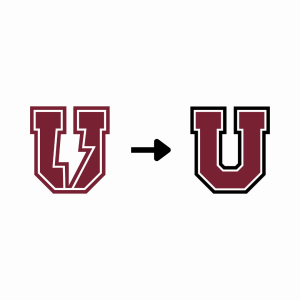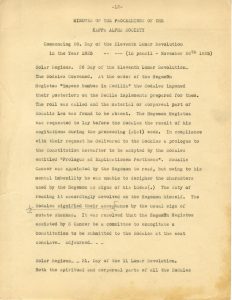Team Trans Talks Hockey, Life, Politics
April 7, 2022
Thursday, March 31, the Office of Intercultural Affairs, LGBTQ+ Committee, Union Price, and Union Athletics sponsored a Transgender Day of Visibility Panel Discussion: Assistant Athletics Director for Facilities and Kent State Hall of Fame hockey player Brianne Brinker interviewed members of Team Trans, an all-trans and nonbinary professional hockey team considered the first US sports team made only of transgender or gender-nonconforming players. The team began in 2019 when Boston Pride Hockey player Aidan clearly asked teammate Greg Sargent to help make a team from a trans hockey player Facebook group. Team Trans first played in Boston’s Friendship Series against the Boston Pride Hockey Select team that November.
Team panelists were Mason LeFebvre (goalie, jersey number 32, Vice President, media coordinator, founding member), Danielle McLean (plays “wherever [needed], jersey number 20), and defenseman Sage Buch. The players recalled their ways to and time on the team: Mason joined “relatively late” for Boston’s series, having found out a month and a half prior, and organized the team’s November 2021 Madison, Wisconsin series. He recalled a “really cool” exchange with the National Hockey League (NHL) which yielded a video of “eight or nine” NHL players saying their pronouns and well-wishes to the team.
When Buch left Division III (D3) hockey at Utica College (“I realized I probably shouldn’t play women’s ice hockey when I’m not a woman”) they went to Utah, where Buch still plays women’s ice hockey. On Team Trans they “felt like [they] were a 12-year old going to” their first away hockey camp, and had “worlds and away the best experience that [they’ve] ever had with hockey.” They said also that they didn’t “have to hold back” like in women’s hockey and “[got] to go full speed!”
Prior to her learning of the team, Brinker had been refereeing and coaching youth games and thought she was done playing. She first heard of the team in following LeFebvre on social media, and attended the Madison event, the “most amazing event [she has] ever been involved with”. It included an exhausting practice (“they were skating the heck out of us at first”) and she “couldn’t talk to enough” of the “46 or 47” people present.
When asked how “what was going on inside [affected] their] play” before Team Trans, LeFebvre recalled early intramural and Division III games when he was out to just his boyfriend. Despite enjoying playing then, in women’s locker rooms he felt he “couldn’t relate to[…] people” except for his captain, who eventually came out as transmasculine. A year after being out to friends and family, Mason told his team he was starting testosterone the next morning. They, “some of the most chill people that [he knows]”, were supportive. McLean recalled high school hockey; after fighting cancer senior year she was not recruited. She then was a walk-on in Hofstra University’s men’s club team: “It was fast. It was really good hockey; a lot of contacts”. She described “hockey bro culture” growing up as “pretty toxic” and came out a “year or two” after college”, losing many of her closest friends and many of her high school hockey friends.
She then joined Boston Shamrocks hockey, a bunch of “drunk Boston Irish girls” like herself, as then giving her the “community that [she] desperately needed.” She now plays adult women’s hockey in the DC area, and met her partner through hockey. Buch recalls “rocky” times in college hockey after realizing they were “somewhere on the gender spectrum” before they were out to themself, and “watching trans masculine people on the internet wishing [they] could be like them.”
Once in the college locker room, wondering how to come out to their team, Buch heard teammates joking about someone who came out two years prior. This “formed a barrier between” between Buch and the rest of the team even though they felt “so close to [the teammates] 30 seconds before”. Buch left the league and college hockey, despite a promising career given a first-year starter spot. Their league now in Utah has “some of the most welcoming people [they’ve] ever met”. Buch recalled the chant “Go ladies! And Buch!” and says they “ended up in a really wonderful place”.
McLean and Buch have had experience too in pro-trans media or advocacy: last year McLean, a journalist, wrote a story published in Teen Vogue and other outlets on Rio Grande Valley, Texas’s Adelyn Vigil, a 13-year-old trans child pushed discriminated against in cheerleading and other school activities. It is “very tough to get a trans child to want to tell their story, to put their name out there in states that are actively hostile and trying to prevent them from playing sports”, said McLean, segueing to some reporters having “really terrible questions, asking 8-year-olds about genitals and stuff like that.” Vigil’s principal banned her from joining the team she wanted; she suffered anxiety panic attacks due to bullying and more. The American Civil Liberties Union (ACLU) focused on her situation though she declined to file a suit due to Texas’s legal climate and her social environment. “They had child services hunting trans children down[…] trying to break up families,” said McLean.
Buch, long an advocate in Utah, a state “kind of tricky for a trans person” is on Utah Pride Center’s Board of Directors and has led youth peer support groups. They said Utah has 75,000 kids in youth sports, 4 of them trans, and 1 of them in girls’ sports, meaning Utah’s recent House Bill (H.B.) 11, backed by $500,000 in lobbying is “to stop one girl from playing sports.” The girl, who Buch emphasized isn’t winning state records or titles, “is going out there and playing sports that she loves with friends.” Buch added that 86% of Utah trans youth have considered suicide, and 56% attempted, compared to 40% having attempted US-wide. And, said Buch, 40% of Utah trans youth are homeless, largely from anti-trans conservative and religious values. The bill passed the Republican-led Utah State Legislature and was vetoed by Republican Governor Spencer J. Cox, who wrote of his veto: “I don’t understand what [trans youth] are going through or why they feel the way they do. But I want them to live. And all the research shows that even a little acceptance and connection can reduce suicidality significantly”. Three days after the veto the bill became law by Special Legislative Session. For all youth, Buch emphasized, sports are for forming relationships, social skills, sportsmanship and hard work. Buch lamented that “it is terrible how targeted so many of these bills are and how much they’re coming not from a place of any scientific literature, not from a place of any true knowledge or concern about women and youth sports”, and that the bill only intended to improve youth in no way other than legislating trans youth.
McLean said “hormones change so much” and said, partly from experience, that after two years of estrogen and testosterone blockers (Thomas began hormone replacement therapy [HRT] in May 2019), one feels relatively “pretty weak.” She added that Thomas has long limbs (she is 6’1”) but so do many women. She said Thomas followed the rules and that “denying trans people this opportunity is awful.”
In the Q&A segment, the panel was asked if degendering sports would help. Lefebvre called degendering impractical, though maybe a good idea. Buch spoke against degendering, as they loved playing women’s hockey, with “more finesse, more passing, more handling of where you’re gonna put the puck” than men’s, which deals with “who is the biggest person on the ice”. They, and McLean, who was for Title IX and keeping gendered sports due to its opportunities for many women, supported consulting endocrinologists regarding fair placement in a sport’s highest levels.
When asked if civil liberties groups reached out to Utah Pride Center after H.B. 11, Buch said no and that groups like ACLU need a defendant to take a case up the court system, possibly to the Supreme Court. On trans issues, Buch recommended following trans members of the Delaware Senate Sarah McBride, Transgender Education Advocates of Utah (TEA), and Transgender Law Center (TLC). McLean referenced National Center for Trans Equality (NCTE), the Trevor Project, Transgender Legal Defense & Education Fund (TLDEF), and Trans Lifeline. After expressing relief throughout the talk for her largely supportive coming out experience, Brinker said in ending the talk that had she not come out she would not be alive today.






